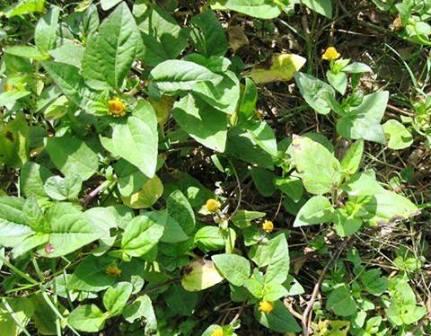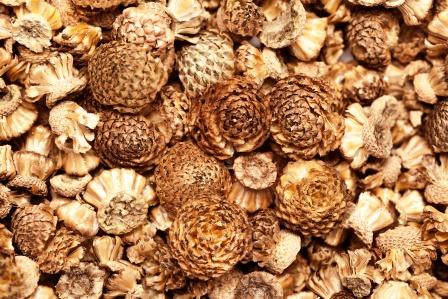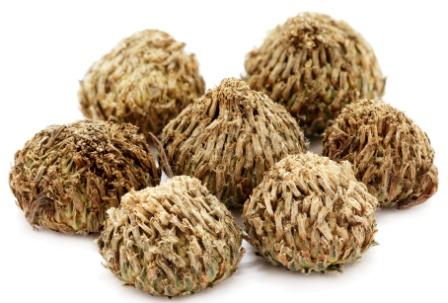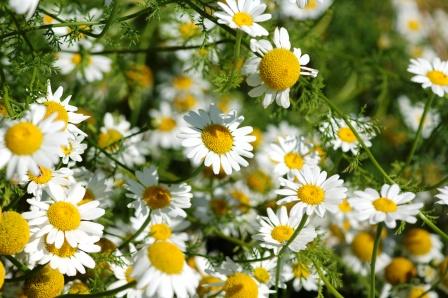Akarkarabha Anacyclus pyrethrum Uses, Research, Remedies, Side Effects
Akarkarabha – Anacyclus pyrethrum is a herb mentioned in Ayurveda for the treatment of the diseases of the oral cavity, indigestion, swelling, sore throat, cough and diseases caused due to the predominance of vata dosha like paralysis, tremors etc.
Latin name- Anacyclus pyrethrum DC.
Family- Asteraceae(Bhringaraja kula)

Table of Contents
Vernacular names
Names in different languages:
Hindi name-Akarkara
English name- Pellitory, Mount Atlas, Daisy Spanish Chamomile
Bengali name- Aakarkara
Gujarathi name- Akkorakaro
Marathi name- Akkalakara
Tamil name- Akkirakaram
Telugu name- Akarakaram
Sanskrit Synonyms
Akallakah – Plant is attractive
Agragrahi, Akulakrit
Scientific classification
Kingdom: Plantae
Order: Asterales
Family: Asteraceae
Tribe: Anthemideae
Genus: Anacyclus
Species: A. pyrethrum
Morphology
Akarakaraba is a small hairy perennial herb growing to a height of 3 feet to 4 feet in the plains of North India. The flowers are pale yellow or whitish in color.
Leaf – Opposite, ovate, glabrous, serrate |
The plant is a native of Africa and Arab nations and brought to India. It is popular as a food spice. It induces heat, tingling and redness when applied to the skin.
Habitat
Its reference is not found in the Samhita period. It is found in Bengal and its natural habitat is in North Africa, Syria, Arabia.
Its flowers and roots are used in therapeutics.
It contains a predominant active principle Pyrethrin which desensitizes the nerve endings.
Properties, part used, dosage
Anacyclus pyrethrum medicinal properties:
Rasa (Taste) – Katu (Pungent)
Guna (Qualities) – Ruksha (Dry in nature), Teekshna (Hot)
Vipaka – – Katu (Undergoes Pungent taste after digestion)
Veerya (Potency) – Ushna (Hot)
Karma (Actions) – Kaphavata shamaka (reduces vitiated kapha and vata dosha), Nadi uttejaka (stimulates the nerves)
Pharmacological actions – Immuno stimulant, Anti diabetic, Cardiac stimulant
Therapeutic indication – Klaibya, Sotha, Agnimandhya, Vata vyadhi

Part used of Akarkara- Root
Dosage- Powder 0.5 to 1 g
Chemical constituents of Pellitory:
The root of the plant contains anacycline, isobutylamide, inulin and a trace of essential oil. The plant also contains Anacyclin and Eneteriyne alcohol.
Home remedies
Home remedies using Pellitory – Akarkara:
1. Pellitory Root powder for toothache:
A pinch of root powder (or flowers even) is taken and kept in the base /gum of the affected teeth/tooth ache. This gives relief within 5-10 minutes. This will reduce the swelling and pain also.
2. Flower head powder/paste of Akarkara in erectile dysfunction:
The flower head paste or powder(500 mg) is cooked with milk and given once or twice a day. This acts as a sexual stimulant, delays the ejaculation and promotes sexual power/desire.
3. Root powder immersed in oil as sexual stimulant:
5 grams of root powder is kept on immersion with 60 ml of coconut oil in sunshine for 6-8 days. Then it is filtered and stored. This traditional oil is applied over the genitalia in cases of loss of erectile ability. 15-20 days medication is claimed to be of good effect in this respect.
4. Akarkarabha Hot infusion for sore throat:
A pinch of Akarakarabha flower head or root powder is added to a cup of water and kept for a while. This is used to gargle in cases of tonsillitis and sore throat.
5. Root powder with ghee for urinary retention:
A pinch of root powder is rubbed with 1 spoon of ghee and licked twice with an interval of 30 minutes. This flushes out the urine within one hour.
Click to consult Dr MS Krishnamurthy MD(Ayu), PhD
Uses, Side effects
Uses of Akarakaraba:
- Medicated oil is prepared using the root of Akarakaraba plant and this medicated oil is applied externally to treat cases of paralysis and nervine disorders like tremors of the body, sciatica etc.
- Decoction is prepared from the root of Anacyclus pyrethrum and it is used for gargling in cases of gingivitis, oral ulcers, dental caries and pain in the tooth.
- Paste prepared from the root is applied over the area having a wound associated with pus.
- Fresh juice prepared from the root of the plant is administered as ‘Nasya’ (drops administered through nostrils) to treat rhinitis.
- The medicated oil prepared using the root of Akarakaraba is applied externally over the joints of the body in case of joint pain.
- The cold infusion prepared from the plant is given in a dose of 30-40 ml in cases of slow heart beat/ heart rate.
- The powder prepared from the dried root of Anacyclus pyrethrum is given 1 gram with milk to treat erectile dysfunction and premature ejaculation.
- The cold infusion of the root is given in a dose of 30-40 ml in cases of general debility caused by nerve weakness.
Akarkara for bradycardia:
In case of bradycardia, Vaidyaraj Subhash Sharma has mentioned about the below remedy:
Akarakara churna is mixed along with Pushkaramoola churna, Shrunga Bhasma and Vamsha lochana. It is administered one hour before food along with pomegranate juice, twice a day. Consult a doctor before following this or any other remedies.
It is hot in potency and pacifies Vata and Kapha doshas. Due to its penetrating ability and hotness it is usually not advised in larger dose for oral intake as it may cause or worsen the ulceration, gastritis, colitis, mouth ulcer, regurgitation/ heart burn, IBS etc
In Unani medicines and Chinese remedies this plant is used plentifully especially to obtain the aphrodisiac effect. They prepare its oil and use it externally.
Adverse effect of Akarkara: If the herb is given in additional dosage, it can lead to tremors, excessive salivation, excessive stimulation of the nerves and even lead to loss of consciousness.
Interaction with medicines, supplements
Can this be used while taking Homeopathic medicine?
Yes. This product does not react with homeopathic medicine.
Can this medicine be continued while taking supplements like multivitamin tablets, Omega 3 fatty acids etc?
Yes. Generally, this product goes well with most dietary supplements. However, if you are taking more than one product per day, please consult your doctor for an opinion.
With western
medicines
Seek your
doctor’s advice if you are taking this product along with other western
(allopathic / modern) medicines. Some Ayurvedic herbs can interact with modern
medicine.
If both Ayurvedic and allopathic medicines are advised together, then it is
best to take Allopathic medicine first, wait for 30 minutes and then take the
Ayurvedic medicine.
Ayurvedic medicines
Akallakara choorna, Akarakarabhadi yoga, Akarakarabha avaleha, Chopchinyadi churna, Kumaryasava etc are the unique preparations of this drug.
Formulations cocontainingarakaraba:
Ayrozyme tablet: It is a proprietary medicine useful to treat indigestion, lack of appetite, flatulence and bloating. The syrup form of this medicine is also available.
Braintab tablet: It is a proprietary medicine useful to treat insomnia, improves the memory and concentration power.


6-X tablet: It is a proprietary medicine useful to treat spermatorrhoea , Premature Ejaculation, Oligospermia and Enlarged spermatorrhoea .
Substitute
Spilanthes acmella
Spilanthes calva
Anacyclus depressus
Adlterants
Anacyclus officinarum
Research
Research articles about Anacyclus pyrethrum:
Anti- diabetic activity: The present work is to study for the first time the anti-diabetic properties of aqueous extract of roots of Anacyclus pyrethrum L. in normal and streptozotocin (STZ)-induced diabetic rats and to achieve a primary pharmacological screening contained in the aqueous extract. The anti-diabetic activity of aqueous extract of roots was evaluated by using normal and STZ induced diabetic rats at a dose of 250 mg/kg p.o daily for 21 days. Blood glucose levels were measured using GOD-POD. Per oral administration of the aqueous extract of the roots (250 mg/kg body weight) to streptozotocin-induced diabetic rats exhibited a significant antihyperglycemic activity in STZ-induced diabetic rats.
Anti- oxidant activity: The ethanolic extract of the root of the plant was studied for the anti- oxidant activity. The extract of the root showed significant action in DPPH, Hydroxyl, hydrogen peroxide, nitric oxide in-vitro scavenging models.
Anti- convulsing activity: The present research work was aimed at evaluating the protective effect of ethanolic extract of roots of Anacyclus pyrethrum against electrically and chemically induced seizure in experimental animals. Administration of EEAP significantly delayed the onset of convulsions and reduced the time taken for recovery.
Author:Dr.B.K.Prashanth M.D (Ayu), Ph.D
E mail: [email protected]
Sthanika Karma (Systemic Action)
External – Stimulant, Antipruritic, Anti inflammatory, Analgesic, Antimicrobial in nature, Oil is indicated for external application in Hemiplegia, Weakness of nervous system, etc. Root decoction can be used for mouth gargling in Dental caries, toothache, throat infection etc. External application of the paste on pustules, helps to expel out the pus and facilitate fast healing. If it is applied on a normal skin surface it causes redness and eruptions. Nasal installation is indicated in rhinitis.
Nervous system – Nerve strengthening and stimulant. Indicated in Hemiplegia, facial palsy, Tremors, convulsions, Epilepsy, Parkinson disease, Amavata etc.Digestive System – Strong in potency, Cause burning sensation of tongue and stomach if it is ingested.
Circulatory System – Stimulant, blood purifier, Indicated in generalized edema, Fastens heart rate, increases blood circulation. Indicated in syphilis.
Respiratory system – Indicated in kaphaja kasa, Hoarseness of voice. For kids in respiratory illness, it can be given along with vacha (Acorus calamus)
Reproductive system – Aphrodisiac, Sukrasthambaka ( indicated in premature ejaculation and in impotency)
Excretory system – decreases urine output, indicated in diabetes










